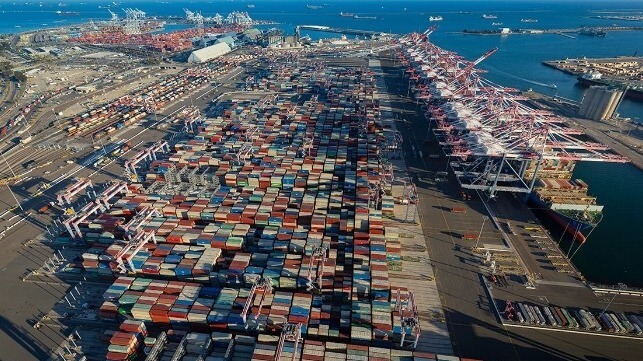ILWU, PMA Stake Out Positions as Contract Talks Begin

The International Longshore and Warehouse Union (ILWU) and the Pacific Maritime Association (PMA) have launched previews of the arguments that they intend to make in their next round of contract talks, which begin May 10, and supply chain stakeholders are watching closely.
The powerful ILWU represents most longshoremen on the U.S. West Coast, and it has a long history of industrial action dating back to the 1930s. Its last major strike in Southern California was in 2014-15, and it led to significant cargo disruption at America's busiest container port complex. This year, all eyes are on its contract renewal talks with the West Coast terminal operators' association. The formal negotiations begin Tuesday and the current contract expires July 1. The transpacific supply chain has already been badly disrupted by last year's import demand surge, and continued lockdowns in China threaten more delays in the months to come; a strike or slowdown could exacerbate these concerns, adding to inflationary pressure.
Wages and benefits will feature prominently in the talks. ILWU longshoremen are compensated well, and the PMA has highlighted the difference between their average earnings and the take-home pay of most Americans. In reply, ILWU president Willie Adams has said that "we make no apologies for achieving wages that allow workers to provide for their families."
Questions of compensation aside, the biggest sticking point could be port automation. The PMA sees automation as an essential way to increase throughput and efficiency, but the ILWU has long viewed automated terminal infrastructure as a threat to the longshore workforce.
"We have seen through experience over the past 18 months that automated terminals were the most effective at handling historic volumes – while also expanding work opportunities for ILWU members," asserted Jim McKenna, the president of the PMA, in a recent address. "Automation allows greater densification at existing port terminals, enabling greater cargo throughput and continued cargo growth over time."

that matters most
Get the latest maritime news delivered to your inbox daily.
However, ILWU views the situation differently. "The bottom line is that automation has killed jobs at the ports. The shipping companies have masked job losses at the automated terminals by diverting cargo from other terminals, but the result is the same: there are fewer boots on the ground and fewer American workers receiving a paycheck," countered Frank Ponce De Leon, ILWU Coast Committeeman.
This time, however, some are optimistic that the ILWU and the PMA will strike a deal without too much disruption. "There’s an incentive because the nation is watching," said Port of Long Beach executive director Mario Cordero, speaking to the New York Times. "There’s too much at stake for both sides."
